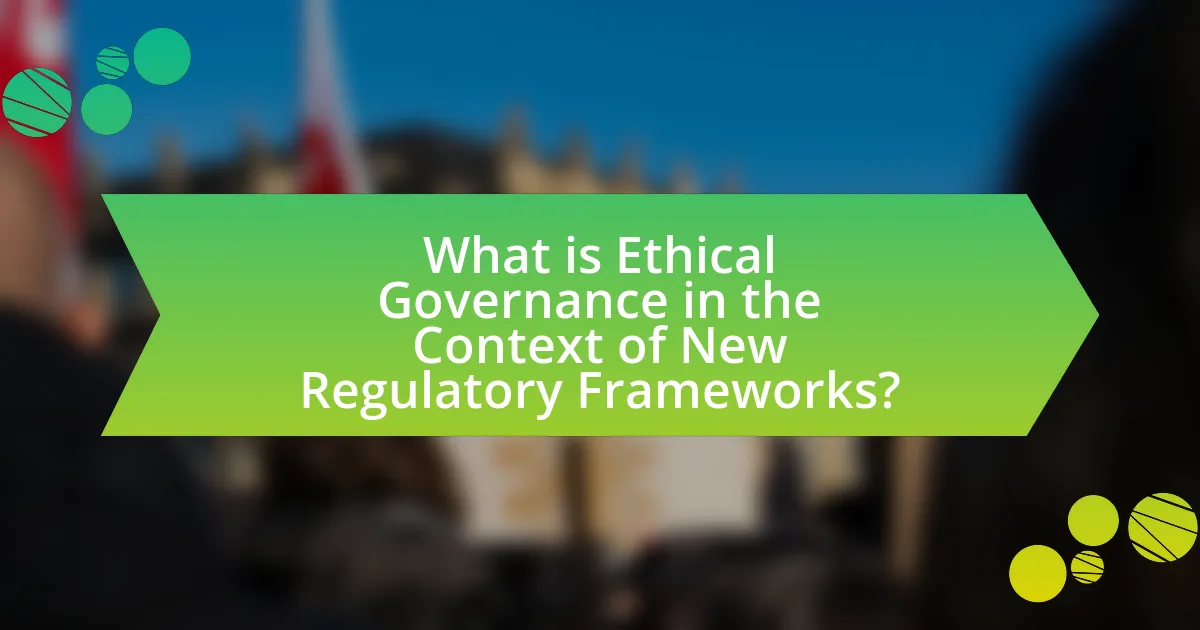Ethical governance is a framework that ensures organizations operate with integrity, transparency, and accountability while complying with new regulatory standards. This article explores the significance of ethical governance in today’s regulatory environment, highlighting key principles such as accountability, transparency, and stakeholder engagement. It examines how recent regulatory frameworks, like the General Data Protection Regulation (GDPR) and the Sarbanes-Oxley Act, influence ethical practices and the consequences of neglecting these standards. Additionally, the article outlines best practices for implementing ethical governance, the role of leadership, and the importance of training and feedback mechanisms in fostering an ethical organizational culture.

What is Ethical Governance in the Context of New Regulatory Frameworks?
Ethical governance in the context of new regulatory frameworks refers to the principles and practices that ensure organizations operate with integrity, transparency, and accountability while adhering to updated legal standards. This governance model emphasizes the importance of ethical decision-making processes that align with regulatory requirements, thereby fostering trust among stakeholders. For instance, the implementation of the General Data Protection Regulation (GDPR) in the European Union has necessitated organizations to adopt ethical governance practices that prioritize data privacy and protection, ensuring compliance while maintaining ethical standards in handling personal information.
Why is Ethical Governance Essential in Today’s Regulatory Environment?
Ethical governance is essential in today’s regulatory environment because it fosters trust, compliance, and accountability among organizations. In a landscape marked by increasing scrutiny and complex regulations, ethical governance ensures that companies adhere to legal standards while promoting integrity and transparency. For instance, the 2020 Edelman Trust Barometer revealed that 81% of respondents expect businesses to be transparent about their operations and decision-making processes. This expectation underscores the necessity for organizations to implement ethical frameworks that align with regulatory requirements, thereby mitigating risks associated with non-compliance and enhancing their reputation.
What are the key principles of Ethical Governance?
The key principles of Ethical Governance include accountability, transparency, integrity, fairness, and stakeholder engagement. Accountability ensures that individuals and organizations are responsible for their actions and decisions, fostering trust and reliability. Transparency involves open communication and disclosure of information, allowing stakeholders to understand governance processes. Integrity emphasizes adherence to ethical standards and values, guiding decision-making and behavior. Fairness ensures equitable treatment of all stakeholders, promoting justice and inclusivity. Lastly, stakeholder engagement involves actively involving all relevant parties in governance processes, enhancing collaboration and informed decision-making. These principles are essential for building a robust ethical framework that aligns with new regulatory requirements and societal expectations.
How do new regulatory frameworks influence Ethical Governance?
New regulatory frameworks significantly influence ethical governance by establishing clear guidelines and standards that organizations must adhere to. These frameworks promote accountability and transparency, which are essential components of ethical governance. For instance, regulations such as the Sarbanes-Oxley Act in the United States have mandated stricter financial reporting and auditing practices, thereby enhancing corporate responsibility and ethical behavior. Additionally, the implementation of the General Data Protection Regulation (GDPR) in Europe has compelled organizations to prioritize data privacy and ethical handling of personal information, reinforcing the importance of ethical considerations in governance. Such regulatory measures create an environment where ethical governance is not only encouraged but also legally required, leading to improved trust and integrity within organizations.
What are the consequences of neglecting Ethical Governance?
Neglecting ethical governance leads to significant consequences, including legal repercussions, loss of stakeholder trust, and reputational damage. Organizations that fail to adhere to ethical standards may face regulatory penalties, as seen in cases like Enron and Volkswagen, where unethical practices resulted in billions in fines and legal costs. Additionally, a lack of ethical governance can erode trust among employees, customers, and investors, ultimately impacting financial performance and market position. Research indicates that companies with strong ethical governance frameworks tend to outperform their peers, highlighting the importance of ethical practices in sustaining long-term success.
How can poor Ethical Governance impact organizations?
Poor ethical governance can severely impact organizations by leading to financial losses, reputational damage, and legal consequences. Organizations with weak ethical standards often face increased risks of fraud and misconduct, which can result in significant financial penalties; for instance, the 2008 financial crisis highlighted how poor governance practices contributed to the collapse of major financial institutions, costing billions in bailouts and lost investments. Additionally, a lack of ethical governance can erode stakeholder trust, as seen in cases like Enron and Volkswagen, where unethical practices led to public outrage and long-term damage to brand reputation. Furthermore, organizations may encounter regulatory scrutiny and compliance issues, as evidenced by the fines imposed on companies like Wells Fargo for unethical sales practices, which totaled over $3 billion. Thus, poor ethical governance not only jeopardizes an organization’s integrity but also its financial stability and market position.
What are the legal implications of failing to adhere to Ethical Governance?
Failing to adhere to Ethical Governance can result in significant legal implications, including penalties, sanctions, and potential criminal charges. Organizations that do not comply with ethical standards may face regulatory scrutiny, leading to investigations by authorities such as the Securities and Exchange Commission or other governing bodies. For instance, the Sarbanes-Oxley Act imposes strict requirements on corporate governance and financial practices, and violations can lead to hefty fines and imprisonment for executives. Additionally, non-compliance can result in civil lawsuits from stakeholders, damaging the organization’s reputation and financial standing.

How do New Regulatory Frameworks Shape Ethical Governance?
New regulatory frameworks shape ethical governance by establishing clear guidelines and standards that organizations must follow to ensure accountability and transparency. These frameworks often incorporate principles such as stakeholder engagement, risk management, and compliance, which directly influence how organizations operate ethically. For instance, the implementation of the General Data Protection Regulation (GDPR) in the European Union has mandated stricter data protection measures, compelling companies to prioritize user privacy and ethical data handling practices. This regulatory shift not only enhances consumer trust but also encourages organizations to adopt ethical decision-making processes that align with legal requirements.
What are the main features of recent regulatory frameworks?
Recent regulatory frameworks primarily emphasize transparency, accountability, and stakeholder engagement. These frameworks are designed to ensure that organizations operate ethically and responsibly, reflecting a growing demand for corporate governance that prioritizes public interest. For instance, the European Union’s General Data Protection Regulation (GDPR) mandates strict data protection measures and transparency in data handling, showcasing the trend towards enhanced accountability. Additionally, frameworks like the Sarbanes-Oxley Act in the United States enforce rigorous financial reporting standards, further underscoring the importance of ethical governance. These features collectively aim to foster trust and integrity in organizational practices.
How do these features promote Ethical Governance?
Features such as transparency, accountability, and stakeholder engagement promote Ethical Governance by ensuring that decision-making processes are open and inclusive. Transparency allows stakeholders to access information about governance practices, which fosters trust and discourages corruption. Accountability mechanisms, such as audits and performance evaluations, ensure that leaders are responsible for their actions, thereby deterring unethical behavior. Stakeholder engagement encourages diverse perspectives in governance, leading to more equitable and just outcomes. These features collectively create an environment where ethical standards are upheld, as evidenced by studies showing that organizations with strong governance frameworks experience lower instances of misconduct and higher levels of public trust.
What challenges do organizations face in adapting to these frameworks?
Organizations face significant challenges in adapting to new regulatory frameworks, primarily due to the complexity and rapid evolution of these regulations. The intricate nature of compliance requirements often necessitates substantial changes in organizational processes, which can strain resources and require extensive training for employees. Additionally, organizations may struggle with aligning existing practices with the new ethical standards mandated by these frameworks, leading to potential conflicts with established corporate cultures. A study by the World Economic Forum highlights that 70% of organizations report difficulties in keeping pace with regulatory changes, underscoring the widespread impact of this challenge.
How can organizations effectively implement Ethical Governance under new regulations?
Organizations can effectively implement Ethical Governance under new regulations by establishing a comprehensive framework that integrates ethical standards into their operational processes. This involves conducting regular training sessions for employees to ensure they understand the ethical implications of their roles and the new regulations. Additionally, organizations should create a dedicated ethics committee to oversee compliance and address ethical dilemmas, thereby fostering a culture of accountability. Research indicates that companies with strong ethical governance frameworks experience 30% fewer compliance violations, highlighting the effectiveness of such measures in aligning organizational practices with regulatory expectations.
What strategies can be employed to align with new regulatory requirements?
To align with new regulatory requirements, organizations can implement comprehensive compliance programs that include regular training, risk assessments, and policy updates. These programs ensure that employees are informed about the latest regulations and understand their responsibilities. For instance, a study by the Ethics & Compliance Initiative found that organizations with robust compliance programs experience 50% fewer incidents of misconduct. Additionally, leveraging technology for monitoring and reporting can enhance transparency and accountability, further supporting adherence to regulatory standards.
How can training and education enhance Ethical Governance practices?
Training and education enhance Ethical Governance practices by equipping individuals with the knowledge and skills necessary to understand and apply ethical standards in decision-making processes. This foundational understanding fosters a culture of integrity and accountability within organizations. For instance, a study by the Ethics & Compliance Initiative found that organizations with comprehensive ethics training programs experience a 50% reduction in misconduct. Furthermore, ongoing education ensures that employees remain informed about evolving regulations and ethical expectations, thereby reinforcing compliance and ethical behavior in line with new regulatory frameworks.

What Best Practices Can Organizations Adopt for Ethical Governance?
Organizations can adopt several best practices for ethical governance, including establishing a clear code of ethics, implementing robust compliance programs, and fostering a culture of transparency. A clear code of ethics provides guidelines for acceptable behavior and decision-making, ensuring that all employees understand the organization’s values and expectations. Robust compliance programs, which include regular training and monitoring, help organizations adhere to legal and regulatory requirements, reducing the risk of unethical behavior. Fostering a culture of transparency encourages open communication and accountability, allowing employees to report unethical practices without fear of retaliation. These practices are supported by research indicating that organizations with strong ethical governance frameworks experience lower instances of misconduct and improved stakeholder trust.
What role does leadership play in fostering Ethical Governance?
Leadership plays a crucial role in fostering ethical governance by establishing a culture of integrity and accountability within organizations. Effective leaders model ethical behavior, set clear expectations for ethical conduct, and create an environment where ethical decision-making is prioritized. Research indicates that organizations with strong ethical leadership experience higher levels of employee trust and engagement, which are essential for ethical governance. For instance, a study published in the Journal of Business Ethics found that ethical leadership significantly correlates with employees’ ethical behavior and organizational commitment, reinforcing the importance of leadership in promoting ethical governance.
How can leaders model ethical behavior within their organizations?
Leaders can model ethical behavior within their organizations by consistently demonstrating integrity, transparency, and accountability in their actions. For instance, when leaders openly communicate their decision-making processes and the rationale behind them, they foster a culture of trust and ethical standards. Research indicates that organizations with transparent leadership practices experience higher employee engagement and lower turnover rates, as employees feel valued and respected. Furthermore, leaders who hold themselves accountable for their actions set a precedent for their teams, encouraging similar behavior throughout the organization. This approach aligns with findings from the Ethics & Compliance Initiative, which shows that ethical leadership significantly enhances organizational culture and compliance with regulatory frameworks.
What systems can be put in place to ensure accountability?
To ensure accountability, organizations can implement systems such as transparent reporting mechanisms, regular audits, and clear performance metrics. Transparent reporting mechanisms allow stakeholders to access information regarding decision-making processes and outcomes, fostering trust and responsibility. Regular audits, both internal and external, provide an objective assessment of compliance with regulations and ethical standards, identifying areas for improvement. Clear performance metrics establish specific, measurable goals that hold individuals and teams accountable for their actions, ensuring alignment with organizational values and regulatory requirements. These systems collectively enhance accountability by promoting transparency, oversight, and measurable performance.
How can organizations measure the effectiveness of their Ethical Governance?
Organizations can measure the effectiveness of their Ethical Governance through a combination of quantitative metrics and qualitative assessments. Key performance indicators (KPIs) such as the number of ethical violations reported, employee satisfaction surveys regarding ethical culture, and compliance audit results provide concrete data on governance effectiveness. For instance, a study by the Ethics & Compliance Initiative found that organizations with strong ethical cultures experience 50% fewer misconduct incidents. Additionally, regular assessments through third-party evaluations and stakeholder feedback can offer insights into the perceived integrity and ethical behavior within the organization. These methods collectively enable organizations to gauge their ethical governance and identify areas for improvement.
What metrics are useful for assessing Ethical Governance practices?
Useful metrics for assessing Ethical Governance practices include compliance rates, stakeholder engagement levels, and transparency indices. Compliance rates measure adherence to ethical standards and regulations, indicating how well an organization follows established guidelines. Stakeholder engagement levels assess the extent to which an organization involves its stakeholders in decision-making processes, reflecting its commitment to ethical practices. Transparency indices evaluate the clarity and openness of an organization’s operations and decision-making, which is crucial for building trust and accountability. These metrics collectively provide a comprehensive view of an organization’s ethical governance performance.
How can feedback mechanisms improve Ethical Governance?
Feedback mechanisms can improve Ethical Governance by facilitating transparency and accountability within organizations. These mechanisms allow stakeholders to provide input on governance practices, which can lead to more informed decision-making and adherence to ethical standards. For instance, regular surveys and open forums enable employees and the public to voice concerns about unethical behavior, thereby prompting corrective actions. Research indicates that organizations with robust feedback systems report higher levels of ethical compliance and trust among stakeholders, as evidenced by a study published in the Journal of Business Ethics, which found that companies implementing feedback loops saw a 30% increase in ethical behavior reporting. This demonstrates that effective feedback mechanisms are essential for fostering an ethical culture and ensuring governance aligns with regulatory frameworks.
What are the common pitfalls in Ethical Governance implementation?
Common pitfalls in Ethical Governance implementation include lack of stakeholder engagement, insufficient training, and inadequate monitoring mechanisms. Lack of stakeholder engagement can lead to policies that do not reflect the values and needs of the community, resulting in resistance and non-compliance. Insufficient training for employees on ethical standards can create confusion and inconsistency in ethical behavior, undermining the governance framework. Inadequate monitoring mechanisms fail to ensure accountability and transparency, allowing unethical practices to persist without detection. These pitfalls are supported by studies indicating that organizations with strong stakeholder involvement and comprehensive training programs report higher compliance and ethical standards.
How can organizations avoid these pitfalls?
Organizations can avoid pitfalls by implementing robust ethical governance frameworks that align with new regulatory standards. Establishing clear policies and procedures ensures compliance and promotes accountability among employees. Regular training on ethical practices and regulatory requirements enhances awareness and fosters a culture of integrity. Additionally, organizations should conduct regular audits and assessments to identify potential risks and address them proactively. Research indicates that companies with strong ethical governance frameworks experience fewer compliance issues and improved stakeholder trust, as evidenced by a study from the Ethics & Compliance Initiative, which found that organizations with effective ethics programs report 50% fewer incidents of misconduct.
What lessons can be learned from organizations that failed in Ethical Governance?
Organizations that failed in Ethical Governance highlight the critical importance of transparency and accountability. For instance, the Enron scandal demonstrated that a lack of ethical oversight can lead to catastrophic financial consequences and loss of stakeholder trust. Additionally, the Volkswagen emissions scandal revealed that prioritizing profit over ethical standards can result in severe legal repercussions and damage to brand reputation. These cases underscore the necessity for robust ethical frameworks and compliance mechanisms to prevent misconduct and ensure sustainable business practices.
What practical steps can organizations take to enhance Ethical Governance?
Organizations can enhance Ethical Governance by implementing a robust framework that includes clear ethical guidelines, regular training, and accountability measures. Establishing a code of ethics provides a foundation for expected behaviors, while ongoing training ensures that employees understand and adhere to these standards. Additionally, organizations should create mechanisms for reporting unethical behavior without fear of retaliation, fostering a culture of transparency. Regular audits and assessments of ethical practices can identify areas for improvement, ensuring compliance with evolving regulatory frameworks. Research indicates that organizations with strong ethical governance frameworks experience lower instances of misconduct and improved stakeholder trust, reinforcing the importance of these practical steps.






